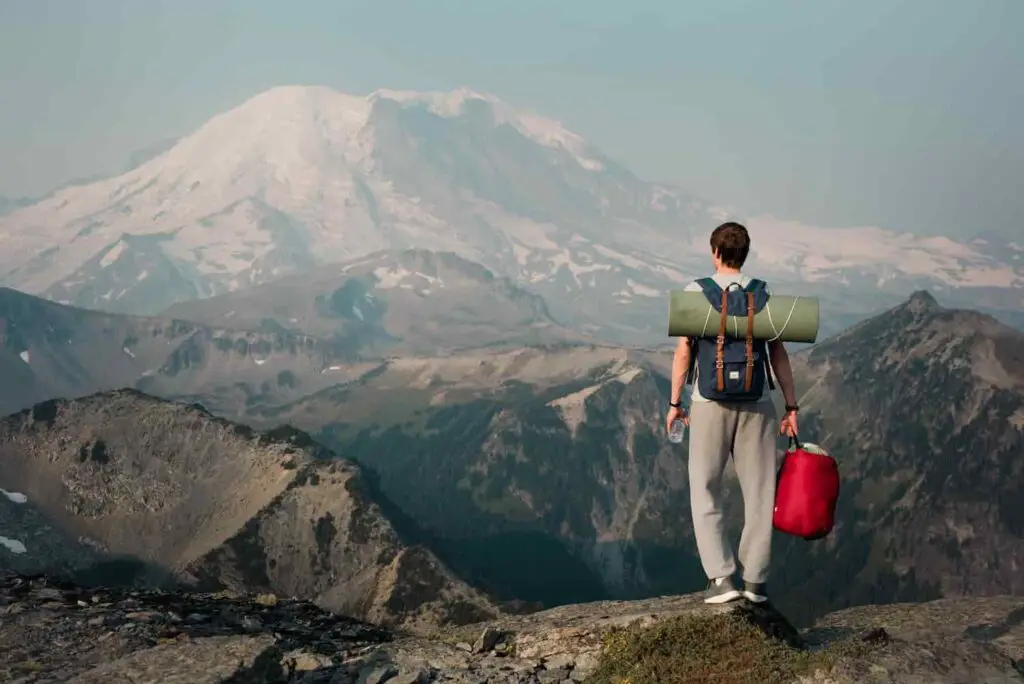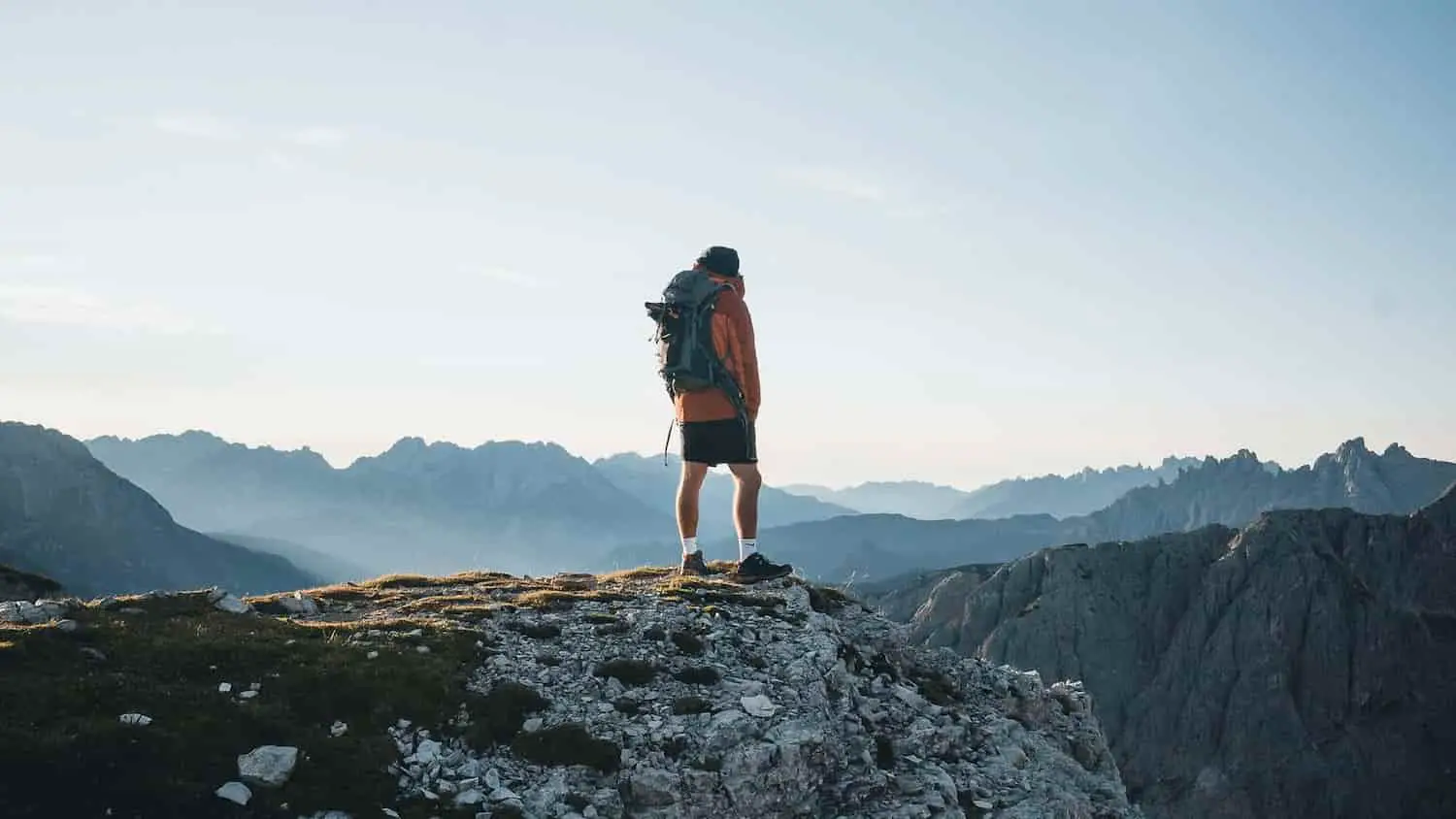Is hiking daily bad for you? Or is it healthy? It’s safe to say that humanity has been more sedentary than ever due to increasing technology, so hiking frequently should bring as back to our roots as well as bring us health benefits right?
Living a sedentary life for too long can lead to dangerous side effects such as heart disease, obesity, diabetes, cancer, osteoporosis and many others.
Most people don’t have the time or the discipline to be able to endure an intense workout session at the gym or at home. But, there’s another way to get fit, healthy and happy without having to torture yourself. It’s called hiking, this can be a brisk walk through a forest or a trudge through the mountain tops.
There are a numerous amount of positive physical and mental effects when it comes to hiking everyday. But too much of something good and become bad, so when is too much? Or perhaps it’s not about frequency and volume, but more about technique and experience.
In fact, hiking is stereotyped to be an incredibly vigorous and draining exercise which takes a toll on your feet and legs. So that makes trekking daily seem like it would break down your body. However this is not always the case.
A general rule of thumb is to hike at a pace that you can talk, but you are puffing slightly. This is called a brisk walk. In terms of heart rate, aim for 40-60% of your maximum heart rate capacity to ensure a brisk but healthy walk.
Hikes can be low intensity or high intensity, a few hours long or a week long and on a high mountain trail with low oxygen or at a local forest at sea level. Since there are so many different factors, when is hiking daily good for you?
Expert hikers say that with the right equipment, technique, elevation, time length and trail, hiking can be for everyone.
Some people can hike 18 miles a day for weeks straight and hikers have reported increased health benefits after hiking 25 miles a day for a month straight with a couple rest days mixed in.
Here’s what happens to your body when you hike everday.
What is hiking?
Hiking is taking a walk for a long period of time, usually on a trial in a peaceful environment and connecting with nature along the way. The most common places to hike are up a mountain trail or through a forest (aka forest bathing). Hiking is mentally and physically stimulating and relaxing. You have full control over where and how you get your exercise on a hike.
How to start hiking daily
Make sure you are physically and mentally prepared to start frequent hiking everyday if you are a beginner to avoid any risks.
Guidebooks and apps
Keep an app or a guidebook handy which has a map/list of all the trails in your area. These tools will provide you with useful information on the types of plants and animals you will see, the path of the trails, and how the hike may vary depending on the season or time of year.
Hydration
Start with an easy and simple trail if this is your first time hiking. This way you can test your body and gear to see if you are able to complete harder trails without any problems. I recommend starting a trail that is a mile or two long if it’s your first time.
Since you are going to be hiking daily, you need to be prepared when your body dehydrates quickly, the rate of dehydration will depend on your amount of sweating and your body’s ability to retain water. Bring more water than you need to begin with, with more experience you will understand how much water you need to bring depending on how long the trail is and the weather.
Keep in mind that large amounts of water is heavy, and bringing too much water on a long or steep hike can actually strain your body a lot and cause more harm than good.
Drink periodically as you hike to ensure hydration, this will lighten the load in your pack and maintain your hydration as you complete the hike.
What to bring
It’s critical to pack survival items to account for every scenario. Include an energizing snack with high calories, a torch, a compass, a pocket lighter or matches, a Swiss Army knife, an extra pair of clothes incase you get wet from a stream or sweaty from the sun and a first-aid kit for injuries.
One of the main factors to never neglect on a hike is the strength of the sun. Wear lots of sunscreen, a hat that will protect your entire face and neck from getting sunburnt, preferably a wide brim hat or one with a neck cover. Also bring a pair of sunglasses if you are prone to glare.
The other thing to never neglect is your feet. Spend enough to buy yourself a pair of quality hiking boots, trust me after a few hours of hiking you will either be thankful or in pain, depending on your choice of shoes.
Make sure your new shoes are broken in and have a comfortable fit before hiking to prevent blistering. Also remember to wear long socks which will protect your shins and calfs from scratches and tick bites when passing through shrubbery.
Should I hike daily alone or with a partner?
Hiking daily is a great way to meet new likeminded people, it’s also a good idea to get a hiking buddy if it’s your first time. Preferably someone who has seasoned experience. This will put you in a good place in case you get injured in the woods and need to be treated.
If you ever have to go by yourself, remember to tell someone when you are leaving and when you will be back, in case of an emergency, your buddy can phone help if you are out for too long. Make sure to call them when you return.
Starting the trek at the trailhead is very important when you are alone to ensure that you read the map, stay on the right path and not get lost. Look out for trail signs as you journey and don’t stray too far from the path well travelled.
At each trail marker you arrive at, check for any other directional signs left by other hikers. One of the most common signs are stacked rocks or cairns. These are placed specifically to guide hikers in the right direction, you may also encounter signs which warn of danger down a certain path.
Can you hike everyday?
Of course, a hike doesn’t have to be a week long trudge through a mountain path, it can be a short 1 mile trek through a flat meadow or forest near your house. Simply adjust the difficulty of the hike to suit your needs and sustain your body to be able to do it everyday.
Yes it’s good for the body, it’s actually been proven to increase bloodflow, muscle mass, cardiovascular health, respiratory health and mental health.
Start with hiking once a week for an hour, then increases it every week. Within 2 months you will get in the habit of hiking every single day, even if it’s only a 2-3 mile brisk walk.
All of us already walk everyday, some people’s trip to work is a hike in itself. So of course hiking everyday is doable. In fact, it’s even super healthy and heres why.
1. Calms depression and anxiety
Hiking gets you away from the buzz of all the technology in our world and into nature. It takes you from a fast paced environment to a slow and steady environment.
This is very calming and can significantly increase your mental health. Studies show that hiking can help with depression and anxiety, it can also give you the confidence that you are capable on your own.
The fresh air and warm sun also contributes to a positive mental state by lowering stress hormones and releasing endorphins which are chemicals in your brain that make you feel good. Serotonin is also produced when exposed to nature and the sun while exercising. This chemical is also linked to happiness.
2. Increased blood flow
Hiking increases bloodflow and aids the lymphatic system, it activates dormant muscles which prevents postural problems such as low back pain and a hunchback. Due to these benefits, hiking daily will physically impact the body in a very positive way as long as the intensity of the hike is matched to the individuals ability.
It can also prevent chronic disease and increase your lifespan. All these benefits make sense because as humans we are endurance runners and our distant ancestors would use this advantage to tire out animals when hunting.
As with any form of exercise, the body needs time to recover. Which means you should listen to your body and take a rest day after many consecutive hiking days.
Hiking also has a lower stress on your joints because you are walking at a moderate pace on a soft surface, usually dirt. This also leads to increased bone density as you are carrying weight while walking which prevents fractures.
Trekking is something that should be enjoyed by all ages and can boost health in older generations who are more sedentary. I have an 75 year old grandma who is in very good shape due to frequent but brisk hiking up a mountain trial.
3. Weight loss
Constant trekking everyday will burn off excess calories and if done for long sessions, will put your body into a caloric deficit in most cases. In this state your body will be burning fat as a fuel source and in turn you will lose weight at healthy pace.
Amount of calories burned on a hike can be increased depending on the incline of the trek, the length of the trek, the speed of which you walk or run and the weight of your backpack. The harder you make each of these factors, the more fuel your body will have to burn.
The heavier you weigh, the more calories you need to sustain that weight and the more calories you burn on a hike. This means that the heavier you are, the easier it can be to burn calories on a hike and lose weight. Especially since you only need to be in a slight caloric deficit to start to burn fat.
Hiking will also help you metabolically which is one of the biggest factors when it comes to weight retention. If you have super stubborn fat, maybe try hiking on a fast, but do it with a partner, stay hydrated and keep it short.
Hiking while fasted can be dangerous if you don’t listen to your body, but otherwise it can be extremely effective for fat loss, especially if you do it everyday.
Try going for a pre breakfast hike.
4. Reduced blood pressure & cholesterol
Hiking daily is proven to reduce your blood pressure and cholesterol levels and is more significant the more you do it. Lower levels of both of these will reduce your chance of having diabetes, a stroke or a heart attack.
Trekking is a cardiovascular exercise with many benefits. In fact if you hike on a decline, it is proven to be effective at lowering your blood sugar.
These are factors that are closely linked with heart disease. When you are out hiking you get a lot of natural vitamin D from the sun. healthy levels of vitamin D make you more resistant to heart diseases.
A study done by john hopkins university explains a link between good cardiac health and outdoor exercise such as hiking.
10-30minutes of midday sunlight is recommended for your daily dose of Vitamin D. A daily hike will be more than enough for you to absorb enough vitamin D for your daily intake.
It is also recommended that you get at least 30 minutes of brisk walking or an equivelent exercise each day for a healthy heart. Going for a daily hike of at least 30 minutes a day is proven to be sufficient for optimal heart health.
5. Increased muscle mass
Muscles such as your glutes, quads, hamstrings and calves will be under constant tension for long periods of time. Over time your muscles wil breakdown and recover bigger and stronger. The heavier your pack is, the more stress these muscles will be under, which leads to more breakdown of muscle tissue and bigger muscles after recovery.
6. Strengthens your bond with others
Going on a trek with friends or family can be a great way to strengthen your bond with them. This is especially effective when you go hiking daily with someone. Both of you will be in a calm and peaceful environment, away from the judgement of others and responsibilities.
Helping eachother solve problems as a team and get through a long hike will strengthen the bond. Bonds are stronger between people who have been through a lot together.
7. Sharpens your focus
Hiking is a form of meditation, it calms your mind and sharpens your ability to focus by clearing your mind of chaotic thoughts.
Rumination which is the process of negative thoughts in ones mind is often replaced with positive thoughts and emotions when a person is exposed to nature through hiking for long periods of time.
8. Boosts self confidence
Knowing that you can handle and take care of yourself is one of the key factors to boosting self confidence. When you go hiking daily alone, you will be scared at first, but over time you will become more and more confident.
This will eventually build up a strong foundation of your own self confidence as you now have the knowledge that you are capable by yourself.
9. Increased balance
Trek trails are not smoothly paved concrete. They are the result of many hikers walking down the same path and eroding a trail in the grass. This means that your journey will be bumpy and will require your body to not fall over or trip. You will also be climbing over rocks, travelling on an incline or a decline and crossing streams.
Your body will become stronger day by day, your coordination will increase and also your balance.
10. Reduces your risk of dying from cancer
According to a study by Macmillan cancer support, walking a mile a day can cut risk of dying from cancer by 40%. People with prostate or breast cancer can reduce their chances of dying if they walk or hike 20 minutes a day. Doing around 6 hours of moderate exercise per week such as a hike, can decrease their risk of dying from the disease by up to 50%. Which is equal to around 18 miles a week.
Hiking a mile takes around 15-22minutes on average. This means you only need go for a shot hike daily to get incredible benefits.

How long should I hike everday?
As a beginner you should aim for 2-3 miles per day on a simple trail. However, the average hiker can trek up to 15 miles everyday. The length of the hike can be reduced in the case of bad weather or a heavy backpack. It’s good to warmup and warmdown the body for hiking, an easy way to do this is treat your walk from your home/car to your trailhead and back.
How to choose a trail when hiking everyday?
When choosing a trail that you will trek everyday, make sure the trail is located close to your home, a bus stop or train station. This will help with discipline and time management, especially if you have a full time job.
Make sure to choose easy terrain to trek to be able to frequently hike without body fatigue after a few days. This includes choosing trails that do not have too much uphill parts of the trail. Flatter trails are better for longevity. Also pick trails that are 2-3 miles long, once you get used to these types of trails for a week or two, start going for longer trails.
Mitigating knee risk
Hiking everyday can be good or bad for the knees, depending on how reckless you are. If you take care of yourself and go at a moderate pace, you will actually strengthen your joints rather than diminish them.
However, if you are too careless and slip or place your knees under immense impact regularly, you will experience knee or joint pain.
It’s super important that you warm up your muscles and tendons before going on a hike, and if you are going to hike daily, I recommend you do a nightly stretch routine for your lower body to recover properly.
Neglecting stretches and warmup of the tendons can lead to injury and will put you out of hiking for good in some cases.
Also make sure you don’t carry too much weight in your pack, if your pack is too heavy, it will place immense strain on your knee and ankle joints which is just asking for problems.
Going downhill is when you are most likely at risk of a bad fall, instead of rushing, take your time and go in a zig-zag motion to safely descend.
Another thing which can mitigate knee pain would be to purchase the right shoes. Ones that fit correctly and aren’t too big or too small. Hiking boots and some sports shoes are a safe bet to keep your tendons and joints safe.
Trekking poles come in handy if you are on rough trails or are someone who is prone to injury. These are poles similar to ski poles, which you can use to assist you while walking. If you want to save a few bucks, just use a stick you find along the way.
Conclusion
Hiking daily is great for the mind and body. It can be adjusted to the level of the hiker, and can be done by a beginner or an expert. When starting out, make sure you choose the right trails, pack the right gear and trek for the right amount of time.
If you hike everyday you will improve your lymphatic, cardiovascular and respiratory systems, while also boosting your mental health, increasing bone density, preventing disease and gaining muscle mass.














In other words, my daily ‘dog walks’…the only thing saving me during these work from home times